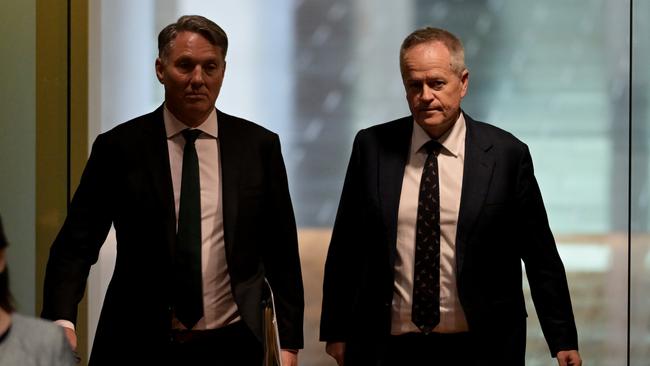
When, 10 or 15 years ago, the ALP’s NSW Right went into ideological liquidation, the centre of gravity on strategic and foreign policy issues, which embody core values for a decent social democratic party, switched to the Victorian Right.
Once they dominated the party’s strategic outlook. Shorten was leader, Stephen Conroy defence spokesman, calling for Australia to undertake freedom of navigation exercises in waters claimed by Beijing in the South China Sea, and all the other names made up the honourable ranks – David Feeney, the late Kimberley Kitching, Michael Danby and several others. Now they’re almost all gone, replaced in the main with politicians of radically different values.
Richard Marles remains, but there’s not much evidence he has any real traction in the Albanese government. As Defence Minister he has delivered almost nothing in budget, resources or urgency.
In his strategic outlook, Shorten embodied the best of Labor traditions. He came up through the Australian Workers Union, as it absorbed the old Ironworkers’ Union, two of the great anti-communist forces in labour movement history. Their values – democratic solidarity, strategic hard-headedness – are needed more than ever.
Shorten was devoted to the US alliance. He understood it deeply and supported it in principle, not just because it was electorally necessary for Labor to have electoral success. And he was a genuine friend of Israel, sometimes courageously so.
Though Shorten must bear responsibility for the failure of his two bids to become prime minister, he had one great characteristic for an aspiring national leader. He thought deeply about strategic issues and foreign affairs. Beyond Green/left zeitgeist climate posturing, such thinking is rare now in senior Labor ranks.
Shorten’s influence inside Labor had been in eclipse in recent years. There was little love lost between him and Albanese. They were different personalities and came from and represented different traditions within Labor. Nonetheless it’s a credit to both men that they didn’t let the tensions cripple the party.
Even with his leadership prospects eclipsed, Shorten, just by his presence and seniority, was an anchor of strategic good sense within the party. Now that’s going too. It’s a new Labor Party.
Shorten didn’t get everything right, or everything wrong, in his long public career. But he’s a distinguished servant of the nation. It’s now up to the Labor Party to keep those strategic values at the centre of their politics.




The loss of Bill Shorten from parliament weakens the strategic ballast, social democratic and pro-US alliance tendency within the Labor Party and within the Albanese government.